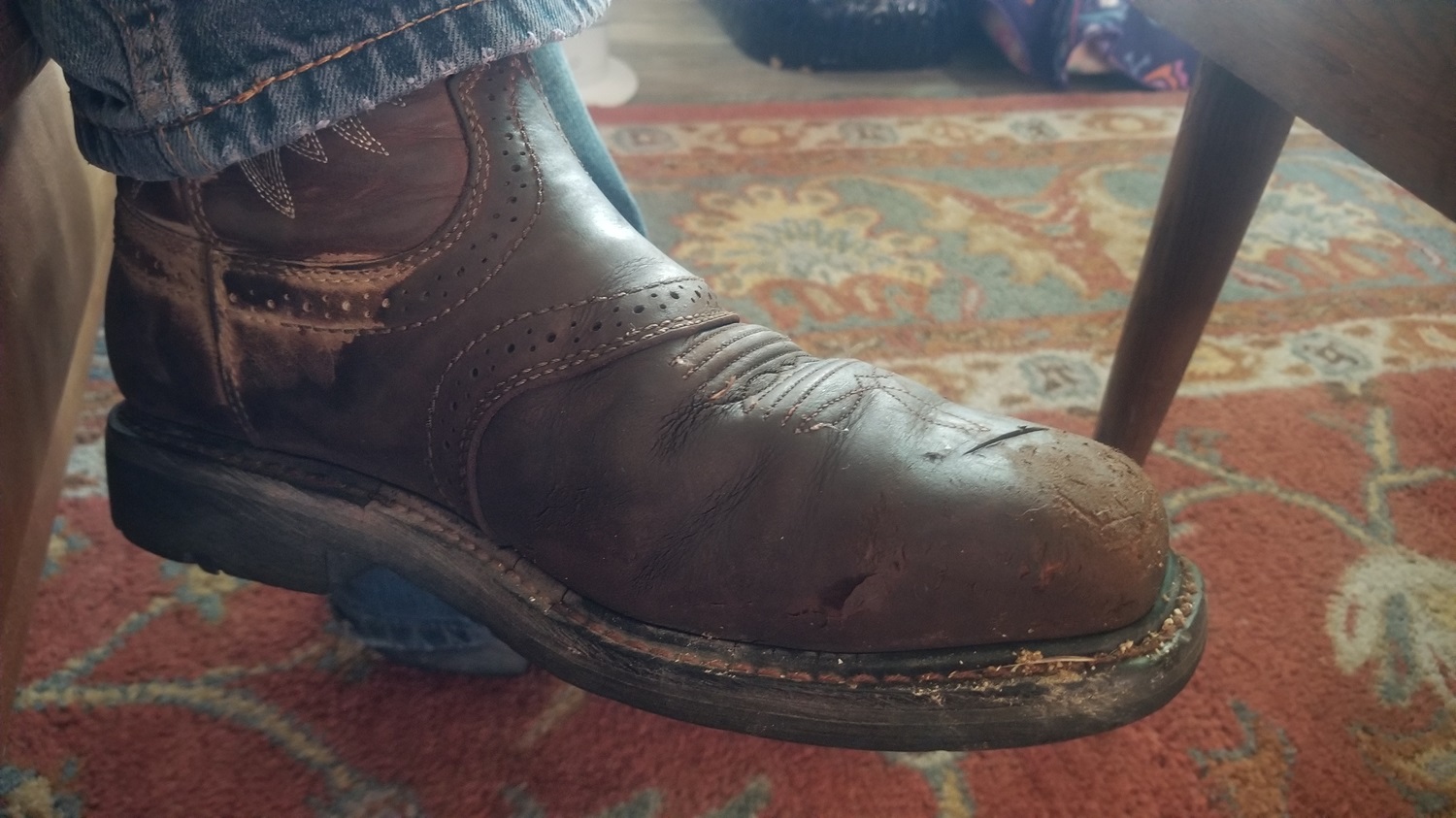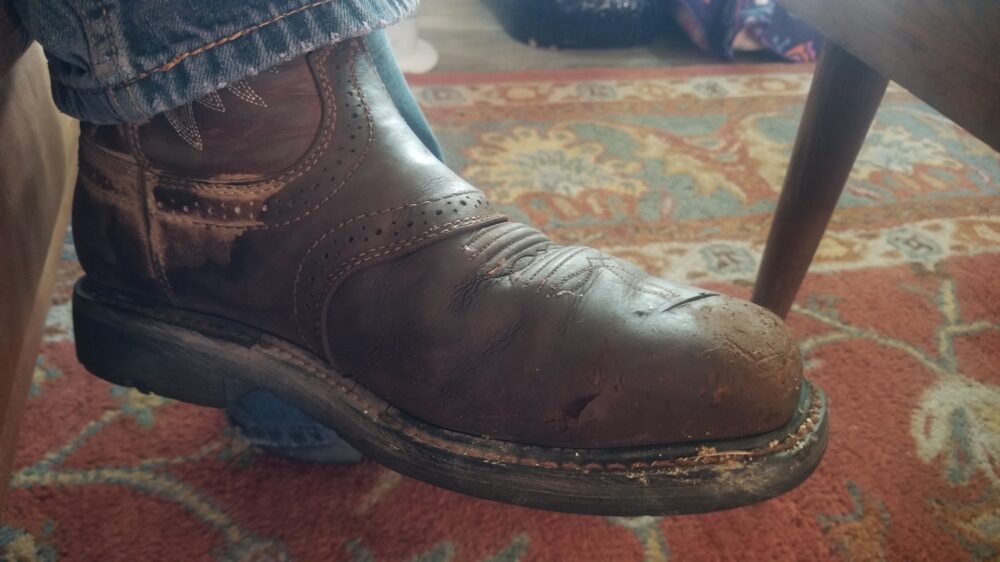
“Sell your cleverness and buy bewilderment.” – Rumi
“I love people. I love being honest. And I love being able to pay bills.” – Brennan Stover, Quench + Temper
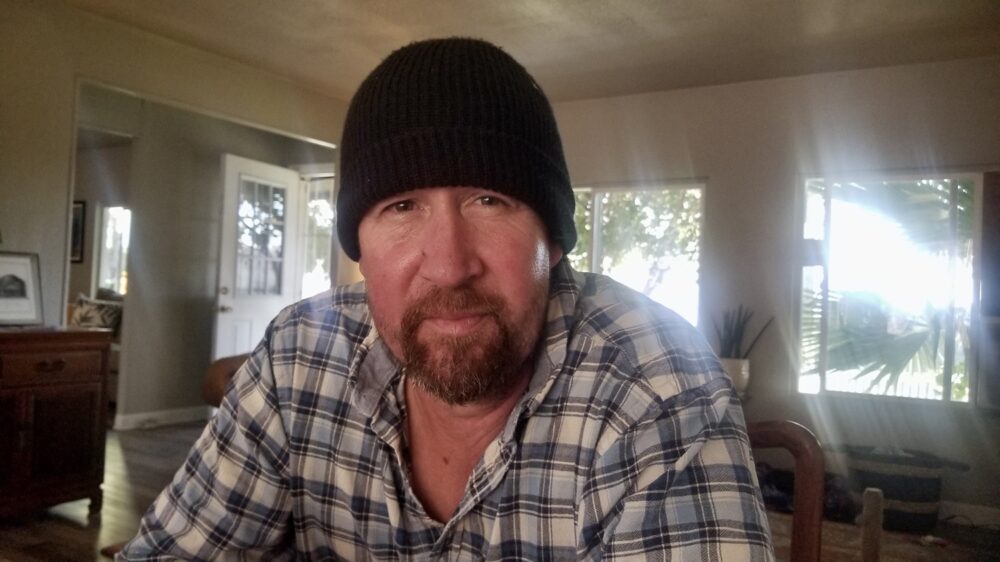
It’s out past the historic Paso Robles District Cemetery, where on this overcast day, a family drags folding chairs behind them to a plot where a few people are already seated, and where children chase each other with pinwheels catching the wind and bright light of the morning. It’s past the farmsteads that dot the landscape and the run of wild turkeys that gather beneath a large oak tree, hanging so far across the road that it meets the tree across it in a tangle of branches above. Not until the road narrows does one reach a silica quarry with a cliff wall shaved so severely that it looks like the trees along the top of the hill will plummet any second, their exposed roots nearly showing off.
Across the street from this quarry is the BAS vineyard and a manufactured home atop its apex that functions as the headquarters for Quench + Temper. Founded in 2016 by vigneron Brennan Andrew Stover, Quench + Temper produces just under 1,000 cases annually of estate-grown wines. The BAS vineyard, dry-farmed and organic, unfolds on a steep incline at 1,400 feet elevation and is planted, at two-thousand vines an acre, to Grenache, Mourvèdre, Graciano and Syrah utilizing the practice of Echalas.
When I pull up to Stover’s home, his partner of a couple of years, Jennifer, invites me in. I find Stover sitting in a corner next to a boarded-up window, the plywood over it covered by an old movie poster of 007, the Sean Connery era. Johnny Cash is on the stereo.
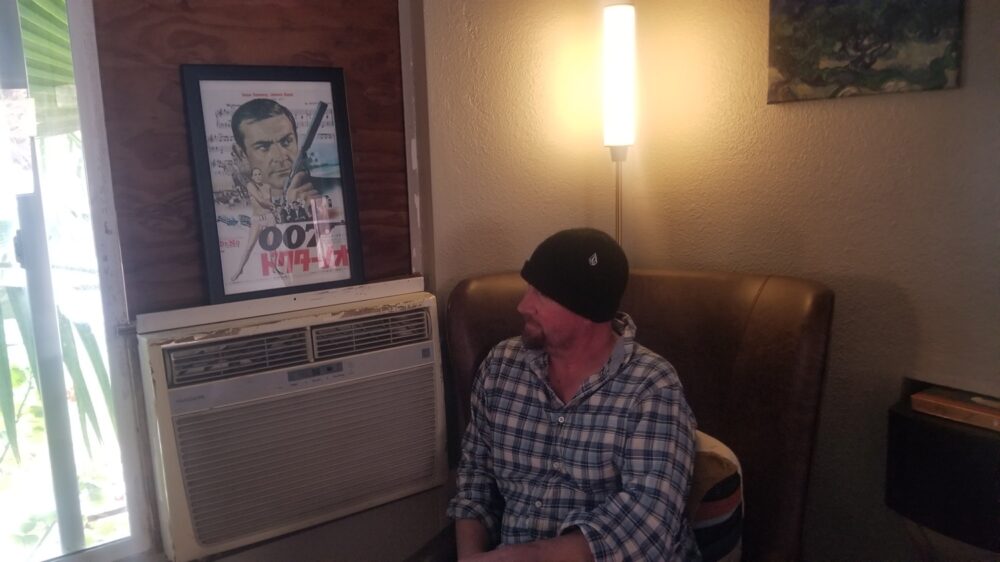
Stover is bleary-eyed and appears exhausted. Jennifer tells me he’s been working for 78 days straight without a day off. He barely makes eye contact when I first arrive, so I take a seat on a worn sofa as Jennifer brings us a couple of glasses of wine and opens a bottle of 2021 Chapter V, a predominately Grenache Q+T bottling with some Syrah and Graciano sprinkled in.
“We’re gonna have a kitty cat party,” he says, seemingly apropos of nothing until I notice two kittens nearby crawling all over each other at his feet. “They’re siblings. They’re too small to go outside. The hawks will come.” He reaches down and pets them.
Stover, 49, is a one-man-show over at Quench + Temper. When he’s not in the cellar or the BAS Vineyard, he’s the vineyard manager for Turley Vineyards and has been for 22 years. His path to becoming a vigneron has been long and unpredictable.
As the Beatles come on, Stover gradually opens up. He speaks in a deep, Kansas drawl, each word drawn out. “So the deal is, and you have to understand, I came from a very impoverished background, right? So, I was very poor.” He joins me on the sofa, takes up a glass. I pick up the bottle and look at the label. “That’s a steel factory on there,” he says. “And those are sunflowers,” describing the quasi-industrial looking red and black artwork. “The person I most look up to is Vincent Van Gogh. That may be a good or bad thing. In fact, that painting right over there is a Van Gogh print.” He points to a print hanging above the stereo.
He is drawn to Van Gogh, he says, because of the “the suffering. He suffered a lot. I suffered a lot. I think I suffered in Kansas. Lots of poverty. Six kids and parents who moved around like gypsies. Living was very difficult. The most important thing, though, is that I’ve always had faith that I can make everything work, but I’m not a made man yet.”
Despite his troubled childhood in Kansas, there are things he misses about it. “I like the people that wave. When you’re driving down the road, I like that they wave in Kansas. We’re all in this world together, and I think the most important thing is that you just love and be honest and be nice. Those are the three most important things. And work hard, so I guess four things. If you can do those four things, then you’re a-okay. And I miss lightning and thunderstorms.”
Is it easier in Kansas or California to do those four things? “It’s easiest inside yourself. No matter where you are. I don’t think other people make you want to wave more, love more, be more honest. I think you take that upon yourself, inside yourself.”
For a while now, I’ve wanted to speak to Stover, but he’s an elusive presence in Paso Robles. He doesn’t socialize much, and when he does, his engagement with others is cursory at best. In 2020, I attended a small, intimate tasting with a group of winemakers in the Willow Creek District of Paso Robles. Stover was there but barely made eye contact with those around the table and left during a brief break without saying goodbye to anyone.
The Rolling Stones come on the stereo. I can’t get no satisfaction. The music is loud and plays on for a long minute or two while Stover remains contemplative. Quiet. Then he tells me, “I think God is good. No matter who your God is.” I raise my glass to Stover when he says this, not so much because I agree, but because what he has said is terribly unfashionable and one rarely hears it, and because of his earnestness. His glass meets mine. “Salud, little girl,” he says.
During his last year of college, studying psychology and anthropology, Stover traveled to Mexico. During a stop at a roadside café, he saw a picture of a winery and vineyard hanging on the wall. Something clicked inside him. At the time, he was working at a steel factory in his home state of Kansas to put himself through school. “It was at the steel factory that I had this epiphany; this is not the way to live. It was a scary place to work. Completely and incredibly dark. I was dirty. The only color was from the parts coming out of the furnace that you had to grab with a tong, then put it in a machine, press it, and put it in an oil bath. That’s quenching and tempering. There was a guy who died right before me. I had to work on the machine he was working on. A part shot out and went straight through him.”
After seeing the winery picture in that Mexican café, he tells me, “I came back home. I was on the back patio with my daddy, smoking a cigar, and I told him, ‘I think I’m gonna do wine. I don’t know anything about it.’ And he said, ‘I think you should.’”
Stover accepted an apprenticeship at one of the five wineries in Kansas at the time. “We made terrible wine.” He began looking for winemaking opportunities elsewhere, and when an opportunity to interview with Turley Winery presented itself, he seized it. “They picked me up in a black Lincoln Continental and drove me to the airport, and then flew me down to Paso Robles, and I’ve been here ever since.”
Because of his job at Turley, he was eventually able to buy a home in Paso, and then the property adjacent to that, which is today the BAS vineyard, planted in 2013. “It’s fucking hard and it’s fucking beautiful. The wine will either take me above or take me below.” Everyone told him he couldn’t dry farm in Paso. “But the thing is, I’m only carrying about four or five clusters per vine.” The BAS vineyard rests at a steep, 45-degree incline. “I slap my face before I get on the tractor, just to remind myself today’s not a good day to die.”
Jennifer brings us a bottle of the 2021 Q+T Graciano. Unfined and unfiltered, it’s crunchy, fresh, and floral. His wines have a distinctive style in that they’re quite fruit-forward but hold on to a lot of tension and structure. When I ask him about his approach in the cellar, he tells me that at the beginning of his winemaking career, he employed “Kansas-style winemaking, which is very manipulative. Then I did Turley-style winemaking, which is very French-oriented; non-filtered, non-fined, made in the vineyard, and you don’t add anything to it. You listen to it. I had an Allemand wine that was very brooding. A Syrah. Viscous. Like olive oil. I thought, ‘I totally want to do this.’ So, I planted my vineyard, but my vineyard didn’t want to do that. The vineyard gave me very lean, mean, lively fruit. It told me exactly what to do. It’s balanced and very alive.”
Considering that he wanted to make something more Allemand-like, I ask him if he’s pleased with the results of his wines thus far. “One thousand percent. The wine is beautiful. These wines have to sell themselves. They have to be sustainable and have to want to be sustainable. That’s up to the wine. And if the wine doesn’t want to do it, it won’t do it.” He tells me he subscribes to the philosophy of Animism, wherein individual spirits inhabit natural objects and phenomena. “The wine has to want to survive. The only thing I can do is just listen, but the wine has to decide that it wants to live. They’re already doing it. They behave. With agriculture and making wine, you don’t think with the front of your head. You think with the back of your head. It becomes very instinctual. Women are way better about this than men. You got to go into the back of your brain. It’s the listening brain. Right there in the very back. It’s intellectual and instinctual.”
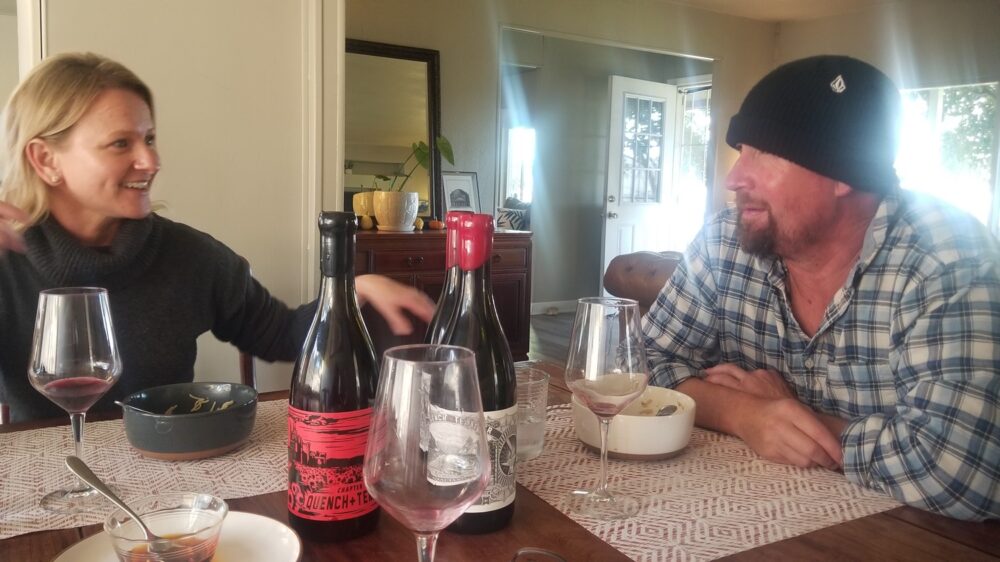
Jennifer ushers us to their modest dining room table, where we sit for lunch. Ramen from Momotaro in downtown Paso. “All the broth spilled out in the car,” she says apologetically. “And that’s the whole thing, the best part.” We still have plenty of Ramen in our bowls, and Jennifer pours us the 2020 La Cantera, a 50/50 blend of Syrah and Graciano. It’s delicious and heady, yet brisk.
Our conversation evolves into something more personal, perhaps because we’re sitting at a table, eating together. Back in college, he had a son. “I met a girl in Mexico. We got married. Three times. Once for the Catholic Church, we got married in a church that didn’t have doors. Then one for the civil service. Then we immigrated to the United States and got married here. We had a son. Then I got divorced three times! My son is twenty-two and he’s up in San Jose. He was three when we got divorced. I had to re-finance my home, give her one hundred thousand dollars, and then I sent her back to Mexico. I mean, I didn’t send her. She went back, and so did my son. I did a lot of trips back and forth. When he graduated high school, he moved here and went to Cuesta College (a local community college serving the community of Paso Robles), then he went to San Jose State. I just need to get him through one more semester and then one more after that.”
I’m curious as to where he finds inspiration as a winemaker. What benchmarks and other wines does he drink? Where does the creative spark come from? “I have always loved Mark Twain. But apart from that? I don’t know. I like to stick a knife in my side and let myself bleed out, then try to learn from that. It would be great to drink beautiful wines, but when you work so hard, you don’t want to drink anything. You really don’t. It’s not because you don’t want inspiration. It’s an inspiration to get up on your tractor and drive the vineyard. It’s an inspiration to get in your cellar and do a pump over. It’s an inspiration to do a barrel down. When you want to get inspiration, you want to feel alive, and I’m as alive as anyone could fucking be. And so, the inspiration that I’m getting is from myself because I have to have that inspiration. I’m not passively going through life looking for inspiration. I’m not. I’m inspired because I’m about to fucking die. I need to come out of the fucking water so I can breathe. I need to get done what I need to get done, and that’s a lot of pressure, and only men who are real men can get that shit done. Once upon a time, there were people who did things that they felt they wanted to do. And that’s incredibly tough to do. You just do the things you want to do and have the feelings you want to have. It’s so incredibly tough to live that way, and you have to be really alive and, as such, really close to death. Most humans can’t live that way. So they end up one step over, to just living. That’s what most people do. To live doing what you want to do? That’s scary!”
He credits Ayn Rand’s “The Fountainhead” as a pivotal book in his life. “In Fountainhead, there were two guys: Roark and Peter. Peter was all about promoting himself. And Roark was all about making art. They were architects. Roark wanted to explore how to get materials out of a quarry, while Peter just wanted to brand himself. That’s what resonated with me. Do the stuff that makes you feel good. I know when I die, at 60 or 70 or 80, I’ll know I did the right thing. Because it’s about art. It’s not about the money. When I go to sleep at night, I feel good. Even though sometimes it’s really fucking tough. The most important thing about this life, little girl, is to take it in, breathe it in, love it and enjoy it. The other thing is to know how fucking important you are.”
Stover looks forward to the day he can afford to build his own brick and mortar winery at the BAS vineyard site. “I have been given everything I’ve ever fucking wanted,” he says, “and I have to be careful about that, because some of those things I asked for can be bad. I have everything I have ever wanted. Will it amount to more? Maybe. But up to this point, God has given me everything I’ve ever wanted.”
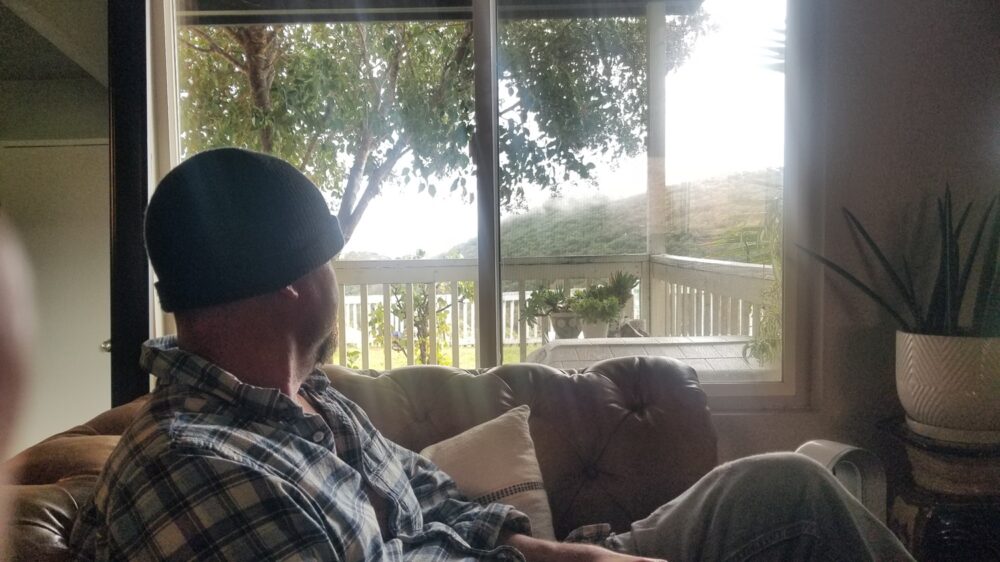
We finish up our lunch, clear the table. Stover asks me if I’ve heard of Emiliano Zapata. “He said, ‘I’d rather die on my feet than live on my knees.’ He had to fight really hard. He didn’t bow down.”
We shake hands and then hug. Soon we’re back outside, and Stover is instructing me on how to back out of his steep driveway. “I knew I was supposed to meet you and you were supposed to meet me. That’s how this world goes. Good people love other good people. Brennan Stover has a lot of love inside of him.”
